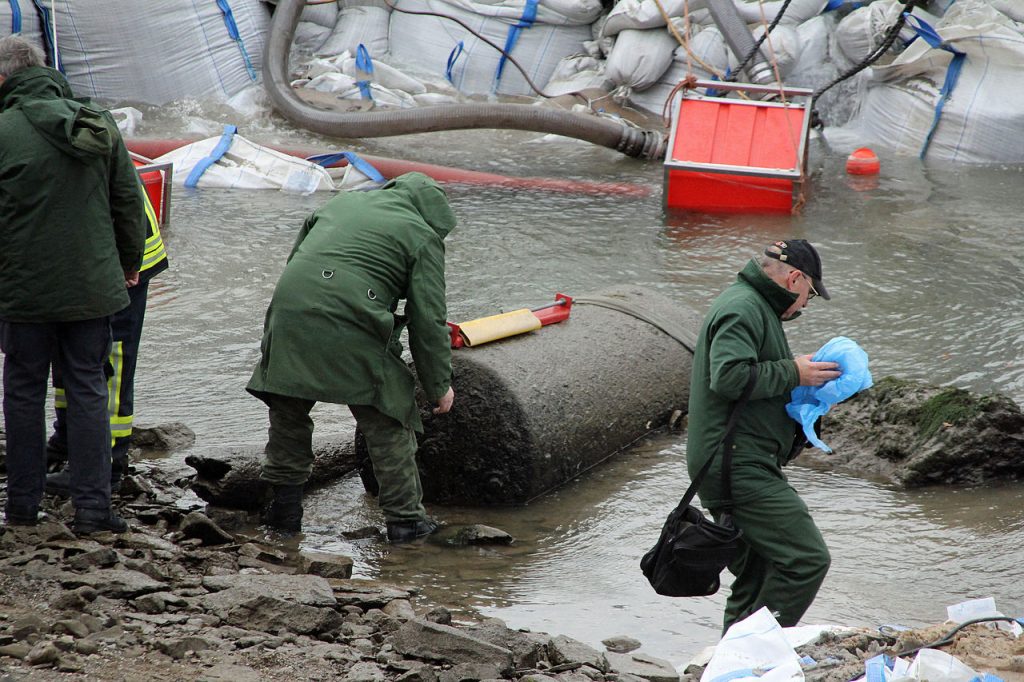Bombenentschärfung in Dresden Posted by Sten on May 25, 2018 in Language
Yesterday, something remarkable happened in Dresden, a city in Sachsen (Saxony), close to the Polish border. A Blindgänger (dud bomb) from the Zweite Weltkrieg (Second World War) was found close to the Altstadt (old city center) during Bauarbeiten (construction work). A bomb that was intended to destroy and kill and did not detonate 75 years ago. What did they do with it? Find out here!
Gesprengt!
On Tuesday, a Fliegerbombe (aerial bomb) was found in Dresden, very close to the Hauptbahnhof (central station), in a densely populated area. The Fliegerbombe, which had a Gewicht (weight) of fünf Zentner (five hundredweights – 250 kg, or about 550 lbs), scared the Bevölkerung (population). Over 9,000 people were evakuiert (evacuated) to prevent any harm in case of an explosion. For two days, they had to find an Unterkunft (accommodation) elsewhere. If the Fliegerbombe exploded, it would send material in a radius of 800 meters (2600 ft)!
So how was this delicate Bombe handled?
Initially, the Fliegerbombe was covered with heavy materials to reign in a possible explosion. Then, the Entschärfer (diffusers) tried to separate the Zünder (ignition) from the Sprengstoff (explosive) from a distance, after a robot applied it to the bomb.
However, this failed, and there was a Teilexplosion (partial explosion). It was unklar (unclear), whether there could be another Explosion. For a day, the Bombenmaterial (bomb material) burned. The Polizei (police) then decided to use a Löschroboter (extinguishing robot) to stop the fire.
They then found out that the Bombe would not explode again, because only a part was detonativ umgesetzt (detonatively converted). That was the Teilexplosion. The rest just served as burning fuel, but could not explode anymore. This is called Deflagration.
Now, it was safe the remove the Bombe.
“Blindgänger”
Shortly, what about that word, Blindgänger? It literally means “blind-goer”, so a bomb that does not reach its goal of detonating, so it “went blind”. However, some Bomben, such as the Fliegerbombe used in this case, were sometimes intentionally not detonated immediately, so that they could be detonated strategically at a later point in time.
Nichts Seltenes
It is not at all selten (rare) for such Bomben to be found. Due to the enormous amount of Bomben (bombs) that were dropped in the Zweite Weltkrieg, Blindgänger are still found now and then, especially during Bauarbeiten as in Dresden. They are often buried close to the surface. However, this one was particularly difficult due to its location: Not only is evacuating 9,000 people quite the ordeal, but it was made even harder because many of them were Bewohner (inhabitants) of an Altenheim (retirement home).
It makes sense that such Operationen occur on a daily basis. Below is a table that shows the estimated tonnage of bombs that were delivered into German territory in the Zweite Weltkrieg:
| Jahr (year) | Tonnen (tonnage) |
| 1940 | 10,000 |
| 1941 | 30,000 |
| 1942 | 40,000 |
| 1943 | 120,000 |
| 1944 | 650,000 |
| 1945 | 500,000 |
| Gesamt (total) | 1,350,000 |
| Blindgänger (geschätzt (estimated)) | 135,000-270,000 |
The amount of not yet discovered Blindgänger in 2013 was geschätzt at 100,000. Jährlich (annually), about 5,500 Blindgänger are entschärft (diffused) in Germany!
The reason that so many bombs did not detonate is not only technisches Versagen (technical failure), but also things like Fehlbedienung (incorrect operation), ungünstige Einsatzbedingungen (unfavorable use conditions) or even Sabotage (sabotage) at the production stage.
Are there Blindgänger in your country? How often are they diffused, are there infamous examples in your country? What do you call them? Let me know in the comments below!

Build vocabulary, practice pronunciation, and more with Transparent Language Online. Available anytime, anywhere, on any device.






Comments:
Peter Haney:
Sehr interessant!
Judy:
We have unexploded bombs in the US. We refer to them as “politicians.” Last estimate was that there were some tens of thousands of them. An infamous example is the current one on Twitter.
Carrlos R. Barron:
Danke fur die informatin aus Antioch,Ca
KipPhoenix:
rein, not reign 🙂
Michael Quinlan:
Really nice interweaving of a current event with historical detail. It’s at a perfect level for me, since I knew many of the highlighted terms, but not all. Thanks.
Sten:
It is about the fact that they are Blindgänger – “blind goers”